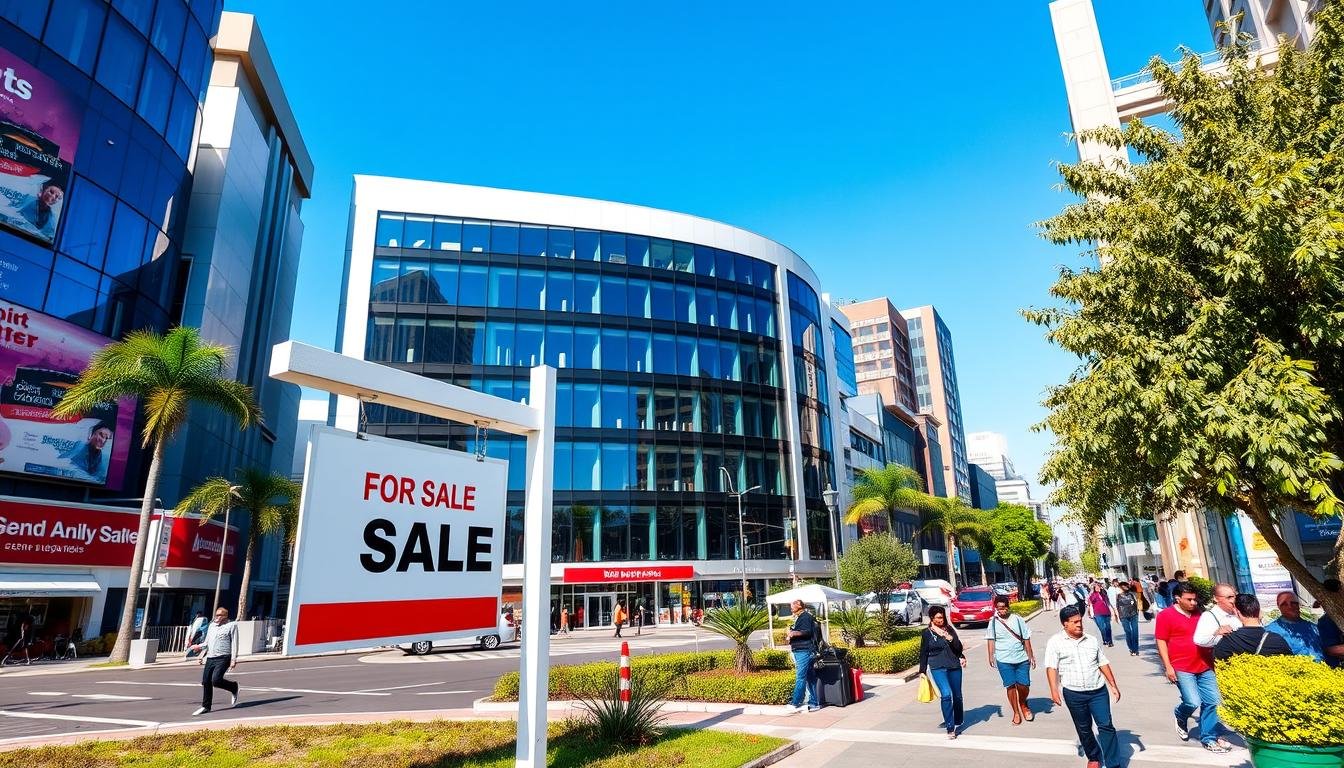Commercial property loans are mortgages that use income-producing real estate as collateral. This includes places like retail centers, office buildings, and warehouses. These loans help finance the buying, building, or refinancing of such properties. They are usually for businesses, not individual homeowners.
Commercial property loans are different from home loans. They have higher interest rates, shorter terms, and stricter rules. Banks, independent lenders, insurance companies, and government programs like the SBA 504 Loan offer these loans. They help commercial real estate businesses grow and expand.
Key Takeaways:
- Commercial property loans are mortgages secured by commercial real estate, used for income-producing properties.
- These loans differ from residential mortgages in terms of loan structure, repayment schedules, and interest rates.
- Commercial property loans are essential for financing the acquisition, development, and construction of commercial properties.
- Lenders, including banks, independent lenders, and government programs, offer specialized commercial real estate financing options.
- Understanding the features and requirements of commercial property loans is crucial for business owners and investors in the commercial real estate market.
Understanding Commercial Property Loans Basics
Commercial property loans are different from home loans. They last from 5 to 20 years and have higher interest rates. Lenders look at the commercial property’s income potential and the borrower’s financial health when deciding on a loan.
Key Features of Commercial Real Estate Financing
- Commercial loans have shorter terms, often 5-20 years, compared to residential mortgages.
- Interest rates on commercial loans are usually higher than residential mortgage rates.
- Commercial real estate loans often involve additional fees, such as appraisal, legal, and origination fees.
- Lenders focus on the property’s ability to generate income and the borrower’s debt-service coverage ratio (DSCR) when evaluating loan applications.
Different Types of Commercial Properties
Commercial property loans can finance many types of properties. This includes office buildings, retail spaces, industrial facilities, and multi-family housing complexes. The type of property can affect the loan terms and requirements.
Purpose of Commercial Property Loans
Commercial property loans are for buying, refinancing, or developing commercial real estate. Lenders check the loan-to-value ratio (LTV) and debt-service coverage ratio (DSCR) when reviewing loan applications.
“Commercial real estate loans are a crucial component of the U.S. economy, with the commercial real estate market valued at $8.8 trillion in 2021.”
Commercial Property Loan vs Residential Mortgages

Real estate financing comes in two main types: commercial property loans and residential mortgages. Both are used for buying or refinancing properties. But they have different features, requirements, and uses.
Commercial property loans are for businesses like LLCs, corporations, and trusts. They have higher interest rates and down payments. These loans are for properties like office buildings and warehouses.
Residential mortgages are for individual buyers. They cover a variety of properties, including homes with multiple units. These loans often have better terms, like longer fixed rates and lower down payments.
| Feature | Commercial Property Loan | Residential Mortgage |
|---|---|---|
| Interest Rates | Higher | Lower |
| Down Payment | Higher (typically 25-35%) | Lower (can be as low as 3-20%) |
| Loan Term | Shorter (1-5 years, with some 15-30 year options) | Longer (15-30 years) |
| Qualifying Criteria | Based on property’s income potential | Based on borrower’s personal finances |
| Occupancy Types | Business entity (LLC, corporation, etc.) | Primary residence, second/vacation home, investment |
In summary, commercial and residential loans serve different needs. They have different requirements and finance different types of properties. Borrowers should think about their goals when choosing a loan.
Types of Commercial Property Loan Options

Borrowers have many choices for financing a commercial property. Each option has its own benefits and needs. The right choice depends on the borrower’s goals and the property’s details.
Traditional Commercial Mortgages
Traditional commercial mortgages are common. Banks and other lenders offer these loans. They have terms from 5 to 30 years and fixed interest rates.
The down payment is usually 20% of the property’s value. But, some programs might allow for less.
SBA 504 and 7(a) Loans
The U.S. Small Business Administration (SBA) has two main loan programs. The SBA 504 loan helps with up to $5 million for commercial property purchases or refinancing. It requires only 10% down.
The SBA 7(a) loan is for various business needs, including buying commercial real estate. It offers up to $5 million in funding.
Bridge and Hard Money Loans
Bridge loans and hard money loans are for quick funding needs. Bridge loans are short-term and interest-only. They help with buying or renovating commercial properties.
Hard money loans are more expensive but also short-term. They’re for those who can’t get traditional mortgages.
Other options include CMBS loans, mezzanine financing, and commercial cash-out refinancing. Each has its own benefits. Choosing the right loan depends on the borrower’s finances, goals, and the property’s details.
Qualification Requirements for Commercial Property Loans
To get a commercial property loan, you need to meet certain criteria. Lenders look for a good credit score (670 or higher), a big down payment (20-45%), and a solid business plan. They check the property’s income potential, your financial statements and tax returns, and your business’s history.
The property appraisal, its condition, and location are key. Borrowers might need to give personal guarantees for newer businesses or special properties to get the loan.
| Qualification Requirement | Details |
|---|---|
| Credit Score | Minimum 670 or higher |
| Down Payment | 20-45% of the property value |
| Business Plan | Well-developed and comprehensive |
| Financial Statements | Thorough review of income, expenses, and tax returns |
| Property Appraisal | Evaluation of the property’s condition and location |
| Personal Guarantee | May be required for newer businesses or special-purpose properties |
Knowing and meeting these requirements can help you get a commercial property loan. It’s tailored to your business needs and goals.
Interest Rates and Terms in Commercial Property Lending
When looking at commercial property loans, interest rates and terms are key. Commercial loan interest rates are usually higher than home loans. They can range from 4% to 13%, based on the loan type and the borrower’s credit.
These rates can be either fixed-rate or variable-rate. The rate you get depends on the property, loan-to-value ratio, your credit, and the economy.
Factors Affecting Interest Rates
The amortization period and balloon payment structure also affect the rate. Longer periods mean lower monthly payments but might have higher rates.
Typical Loan Terms and Structures
Commercial loans usually last from 5 to 20 years. The amortization period can be longer, leading to a balloon payment at the end. This payment must be paid off or refinanced.
Understanding Prepayment Penalties
Another thing to consider is prepayment penalties. These can be yield maintenance or defeasance. They make early loan payoff expensive.
Knowing how commercial loan interest rates work, typical terms, and prepayment penalties helps borrowers. This knowledge helps them find the right financing for their needs.
Understanding Commercial Loan-to-Value Ratios

The loan-to-value (LTV) ratio is key in commercial property lending. It’s usually between 65% and 85%. It’s found by dividing the loan amount by the property’s appraised value or purchase price. Lenders like lower LTVs because they mean less risk.
The LTV ratio affects the interest rate and loan terms. Different properties have different max LTVs. For example, owner-occupied properties can get higher LTVs than investment properties.
Special federal loan programs, like HUD/FHA 223(f), can offer up to 83.3-90% LTV. Private commercial loans might only go up to 65-70%. The Combined Loan to Value Ratio (CLTV) shows all loans against the property’s value.
Keeping the LTV between 75-80% is key for commercial real estate loans. Lowering the LTV can mean lower interest rates. Lenders use the lower of the purchase price or appraised value for LTV calculations.
| Property Type | Typical LTV Ratio Range |
|---|---|
| Residential Apartment | Up to 80% |
| Commercial-Investment | 70-75% |
| Business Properties | 65-70% |
| Hard Money Loans | Up to 65% |
| SBA Guaranteed Loans | Up to 90% for Owner-Occupied |
Knowing about LTV ratios is vital in commercial property financing. It helps lenders see the loan’s risk and set the right terms. With a good LTV, borrowers can get better loan conditions and make the most of their investments.
The Commercial Property Loan Application Process
Getting a commercial property loan is a detailed process. It starts with checking the property’s finances and picking the right loan. This careful planning is key.
The first step is filling out a detailed loan application. You’ll need to provide lots of documents like tax returns and financial statements. This helps lenders understand your situation and the property’s value.
After the application, lenders do a deep dive into your finances and the property. They check everything from appraisals to environmental reports. This can take weeks or even months.
Once they’ve checked everything, they’ll talk about the loan’s terms. This is the closing process. Here, the loan is finalized, and you get the money you need.
Keeping in touch with your lender is crucial. It makes the process smoother and faster. Knowing what to expect and being ready with all the documents can help you get the loan you need.
Key Stages in the Commercial Loan Application Process
- Loan Application and Documentation Preparation
- Underwriting and Due Diligence
- Loan Negotiation and Approval
- Closing and Disbursement of Funds
| Loan Requirement | Typical Criteria |
|---|---|
| Minimum Credit Score | 660 to 680 |
| Business Establishment | 1 to 2 years |
| Equity Requirement | 25-30% for refinancing, 25% down payment for new purchase |
| Occupancy Requirement | 51% owner-occupied for existing property, 60% for new construction |
| Cash Flow Requirement | Sufficient to cover monthly payments, typically 2 years of tax returns |
| Loan Terms | Fixed or variable interest rates, potential prepayment penalties, origination fees |
| Loan-to-Value Ratio | Key consideration for lenders |
Understanding the loan application process helps you prepare better. It increases your chances of getting the financing you need for your real estate goals.
Also Read :What Are Personal Loan Terms And Why Do They Matter?
Conclusion
Commercial property loans are key for businesses and investors in the real estate market. They help with buying, developing, and refinancing properties in different sectors. These loans are more complex than home loans but offer flexible ways to grow businesses and invest in properties.
It’s important to understand commercial real estate financing well. This includes knowing about different loans, what you need to qualify, and the terms. With the right knowledge, businesses and investors can make smart choices and benefit from these loans.
The real estate market keeps changing, and the need for commercial property loans will stay strong. By staying up-to-date and proactive, entrepreneurs and investors can take advantage of the sector’s growth. This helps businesses grow and boosts the economy.
FAQs
Q: What is a commercial property loan?
A: A commercial property loan, also known as a commercial real estate loan, is a type of financing specifically designed for purchasing, refinancing, or renovating commercial properties such as office buildings, retail spaces, or multi-family rental units.
Q: How do commercial real estate loans work?
A: Commercial real estate loans work by providing funding based on the property’s income potential rather than just the borrower’s creditworthiness. Lenders assess the commercial property’s cash flow, location, and overall market conditions when determining loan terms.
Q: What are the types of commercial real estate?
A: The types of commercial real estate include office buildings, retail properties, industrial properties, multi-family housing, and mixed-use developments. Each type may have different financing requirements and loan options.
Q: What is the difference between a commercial loan and a residential loan?
A: The main difference between a commercial loan and a residential loan is the purpose of the property being financed. Commercial loans are used to purchase or refinance properties intended for business use, while residential loans are for personal residences. Additionally, commercial loans typically have different terms, interest rates, and qualification criteria.
Q: How can I qualify for a commercial real estate loan?
A: To qualify for a commercial real estate loan, you typically need a strong credit score, a solid business plan, and proof of income or cash flow from the property. Lenders may also consider your experience in managing similar properties and the property’s location and condition.
Q: What are commercial real estate loan rates and fees?
A: Commercial real estate loan rates and fees can vary significantly based on factors like the lender, the loan type, the borrower’s credit score, and market conditions. Rates are usually higher than residential loans, and fees may include origination fees, appraisal fees, and closing costs.
Q: Can I use a commercial property loan for construction?
A: Yes, you can use a commercial property loan for construction through a commercial construction loan. This type of loan provides financing for the building of new commercial properties or substantial renovations of existing ones.
Q: How do I apply for a commercial real estate loan?
A: To apply for a commercial real estate loan, you generally need to gather necessary documentation such as your business financial statements, tax returns, a detailed business plan, and property information. Then, you can approach commercial lenders, credit unions, or consider SBA loans for financing options.
Q: What are the repayment terms for commercial loans?
A: Repayment terms for commercial loans can vary widely but typically involve shorter terms than residential loans, often ranging from 5 to 20 years. Payments may be structured as amortizing loans or interest-only periods, depending on the loan type and lender requirements.
Q: What are the loan requirements for a commercial real estate loan?
A: Loan requirements for a commercial real estate loan may include a down payment (often 20% to 30%), a solid credit score, proof of business income, and a comprehensive business plan. Additional requirements may depend on the lender’s criteria and the type of commercial property being financed.
Source Links
- https://www.biscred.com/post/commercial-real-estate-loans
- https://www.investopedia.com/terms/c/commercial-real-estate-loan.asp
- https://www.nerdwallet.com/article/small-business/commercial-real-estate-loans
- https://www.investopedia.com/articles/personal-finance/100314/commercial-real-estate-loans.asp
- https://www.bankrate.com/real-estate/commercial-real-estate-loan/


